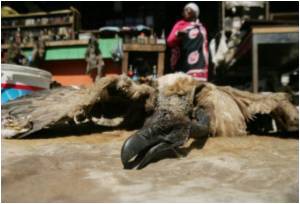
The latest, launched last year near the Annapurna mountain range in central Nepal, has led to a five-fold increase in the local population of the critically endangered bird, conservationists said this week.
Before the turn of the century, an estimated 300,000 vultures cruised the Nepali skies, but scientific studies say their numbers declined by more than 90 percent in just a few years.
Vultures feeding on carcasses treated with diclofenac die of kidney failure, often within 24 hours, said Hum Gurung of Bird Conservation Nepal (BCN), adding: "This is the principal cause of the vulture decline throughout South Asia."
Three of Nepal's six indigenous vulture species are now listed as "critically endangered" by the International Union for the Conservation of Nature.
The loss of a major scavenger has led to a rise in rotting carcasses and a consequent increase in feral dogs and the spread of rabies, anthrax and tuberculosis, according to the government's Vulture Conservation Action Plan.
Advertisement
"Before its establishment, there were around 50 vultures in that area but now around 250 vultures have been recorded during the feeding at the restaurant," Gurung told AFP.
Advertisement
BCN buys old and terminally ill cattle and takes the animals to the restaurants' farms in community-owned forests where they are treated, if needed, with another, vulture-friendly painkiller.
They are allowed to die naturally and, once declared free of diclofenac, are skinned and taken to nearby jungle where they are left out to become the vultures' main course.
Similar schemes have been run successfully in South Africa and Europe but the Nepali project is unique as it is being driven by the local communities involved rather than by external specialists.
With around 860 bird species in a landscape that varies from fertile, semi-tropical plains to snowy Himalayan peaks, Nepal is a paradise for bird watchers.
It now has six vulture restaurants, and BCN says one project set up two years ago at Gaidahawa Lake, in the southern Terai plains, has seen numbers increase from fewer than 40 to as high as 282 at meal times.
As well as providing a place where the birds can get clean meat, BCN has successfully campaigned for the veterinary painkiller to be banned in Nepal -- although it is still being widely used.
Source-AFP








